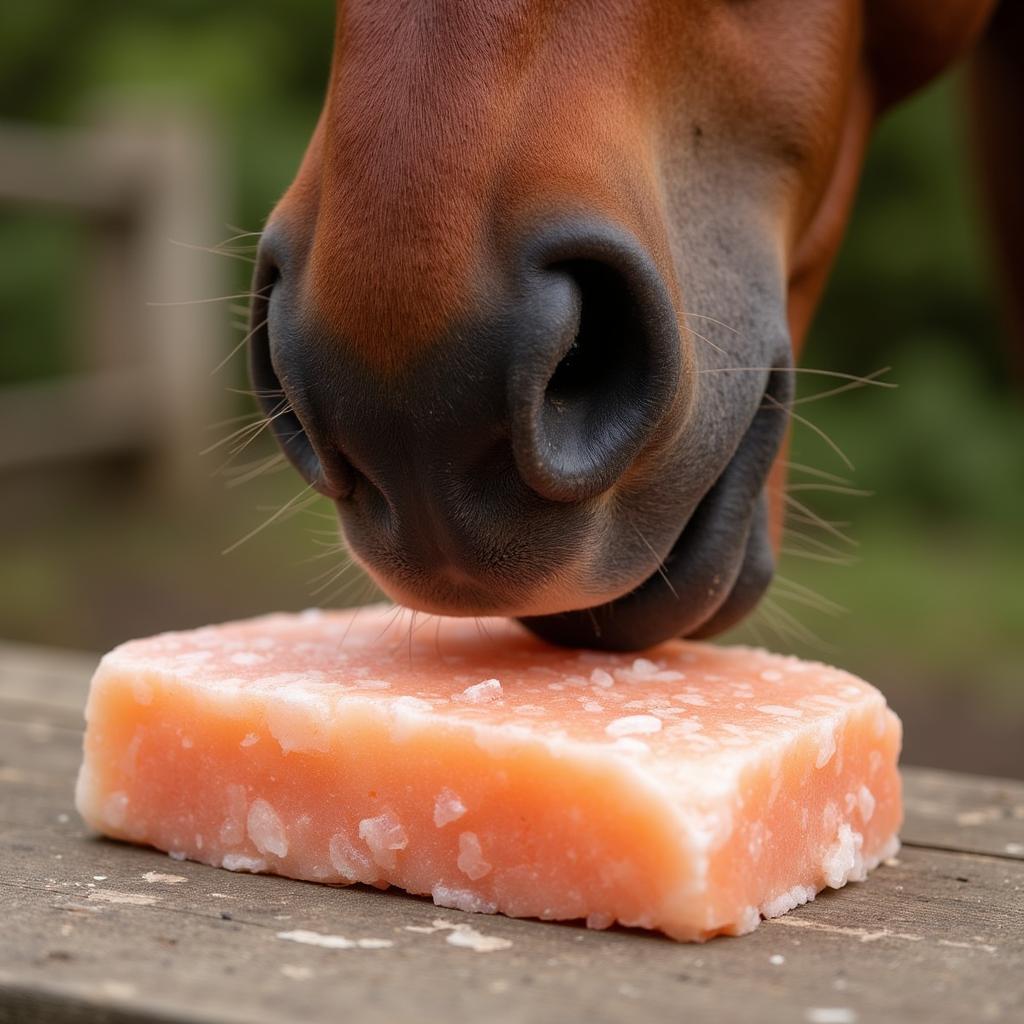A Horse Licker is a salt block specifically designed for horses, providing them with essential minerals and encouraging natural licking behavior. Understanding why horses lick and how a horse licker can benefit their health is vital for every horse owner. Just after their first few weeks, foals begin to develop a taste for salt, mimicking their dams. This article will delve into the importance of horse lickers, addressing common questions and concerns.  Horse licking a Himalayan salt block
Horse licking a Himalayan salt block
Why Do Horses Lick?
Horses lick for a variety of reasons, not just because they crave salt. Licking can be a sign of boredom, stress, or even a learned behavior. However, a consistent need to lick, especially at a horse licker, often indicates a mineral deficiency. Providing a horse licker ensures your horse has access to vital nutrients like sodium and chloride, which are crucial for various bodily functions. These minerals help regulate fluid balance, nerve function, and muscle contractions. Just like humans, horses lose salt through sweat, especially during exercise or in hot weather. A horse licker helps replenish these lost electrolytes. Offering a slicker brush for horses after a sweaty ride can also help keep your horse comfortable and clean.
Identifying Mineral Deficiencies in Horses
While a horse licker can help prevent deficiencies, it’s essential to recognize the signs of existing mineral imbalances. Symptoms can include a dull coat, poor hoof growth, decreased performance, and excessive licking of non-food items. If you suspect a deficiency, consult with a veterinarian for proper diagnosis and treatment. They can recommend specific mineral supplements or adjustments to your horse’s diet.
Choosing the Right Horse Licker
There are various types of horse lickers available, from traditional white salt blocks to Himalayan pink salt and mineral blocks. Choosing the right one depends on your horse’s individual needs and preferences. Some horses enjoy the horse slicker after a good grooming session.
Different Types of Horse Lickers:
- White Salt Blocks: These are the most common and affordable option, providing pure sodium chloride.
- Himalayan Pink Salt Blocks: These contain trace minerals and are believed to have added health benefits.
- Mineral Blocks: These are formulated with a blend of essential minerals tailored to specific needs, such as those for pregnant mares or performance horses.
“Choosing the correct horse licker is crucial for ensuring your horse receives the necessary minerals without over-consuming any specific nutrient,” says Dr. Emily Carter, Equine Nutritionist.
How to Use a Horse Licker Safely
While horse lickers are generally safe, it’s important to use them correctly. Overconsumption of salt can be harmful, so providing free-choice access is generally recommended. This allows your horse to regulate its own intake based on its individual needs. Ensure the horse licker is securely mounted in a safe and accessible location, away from any potential hazards. A hard brush for horses can be used to clean the area around the licker.
Tips for Safe Horse Licker Usage:
- Secure Mounting: Prevent the licker from becoming a tripping hazard.
- Monitor Intake: Observe your horse’s licking behavior to ensure they are not over-consuming.
- Provide Fresh Water: Adequate water is essential for proper electrolyte balance.
- Consult Your Veterinarian: Seek professional advice if you have any concerns about your horse’s mineral intake.
“Remember, a horse licker is a supplement, not a replacement for a balanced diet,” adds Dr. Carter. “A healthy diet consisting of quality hay or pasture, along with appropriate grain and supplements as needed, is the foundation of equine well-being.” Consider adding a stylish charlie 1 horse cowgirl hat to your collection while you’re caring for your horse.
Conclusion
The horse licker plays a vital role in maintaining equine health by providing essential minerals and satisfying natural licking behavior. By understanding the different types of lickers, using them safely, and monitoring your horse’s intake, you can ensure they receive the necessary nutrients for optimal health and performance. If you are interested in learning about horse training, you can explore r+ horse training.
FAQ
- Can horses have too much salt? Yes, excessive salt intake can be harmful.
- What are the signs of mineral deficiency in horses? Signs may include a dull coat, poor hoof growth, and excessive licking.
- How do I choose the right horse licker? Consider your horse’s individual needs and consult with your veterinarian.
- Where should I place the horse licker? Mount it securely in a safe and accessible location.
- How often should I replace the horse licker? Replace it when it becomes significantly worn or contaminated.
- Can I give my horse a salt lick if it has a medical condition? Consult with your veterinarian before introducing a salt lick to a horse with pre-existing conditions.
- What is the difference between a white salt block and a Himalayan pink salt block? Himalayan salt blocks contain trace minerals in addition to sodium chloride.
Common Scenarios
- Scenario 1: Your horse is constantly licking the fence posts. This might indicate a mineral deficiency.
- Scenario 2: Your horse is not interested in its salt lick. Try a different type or flavor of lick.
- Scenario 3: Your horse is consuming the salt lick too quickly. Consult your veterinarian to rule out any underlying medical conditions.
Further Reading
For more information on horse care and related topics, explore other articles on our website.
Contact Us
Need help? Contact us at Phone: 0772127271, Email: [email protected] or visit us at QGM2+WX2, Vị Trung, Vị Thuỷ, Hậu Giang, Việt Nam. Our customer support team is available 24/7.